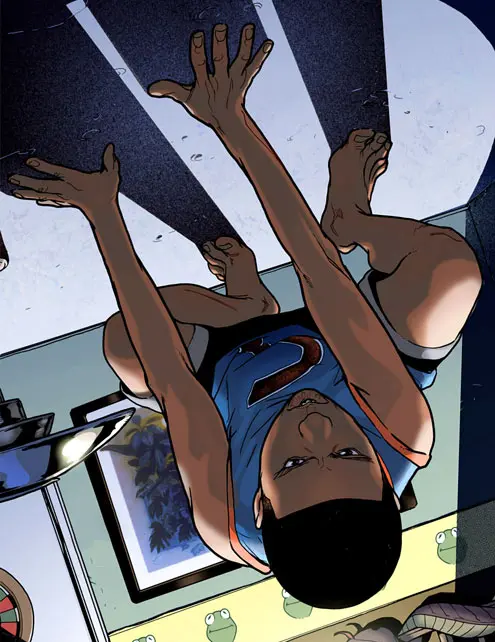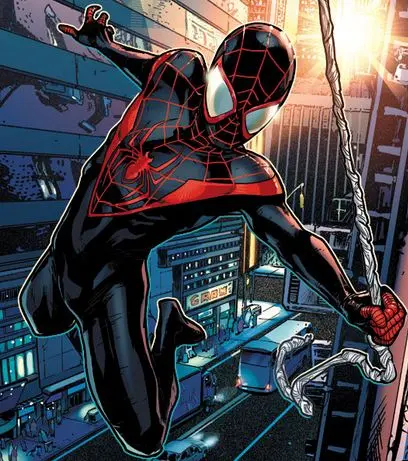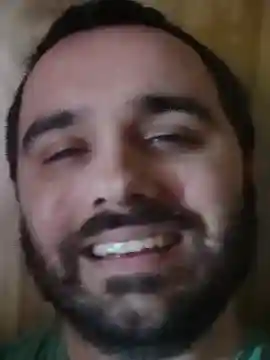There was much to be said when it was revealed that the Ultimate Universe's Spider-Man (Peter Parker) was going to be killed off. For many, Ultimate Spider-Man was the Spider-Man book that hooked a new generation of readers, as the Ultimate line was released to capitalize on those who came to the franchise because of the movies. So how do you smoothly ease someone into the rich history of a character who has been around since 1962? The short answer is you don't even try. Thus, the Ultimate line was created - fresh takes on old characters that people could jump into without having to worry about years of backstory.
Despite not being around for long, Ultimate Spider-Man developed an avid following, so there was much sadness over his death. Along with the grieving, an even more powerful emotion started rising from the fans - anger. Readers were enraged at the fact that it wasn't necessarily Spider-Man who was being killed off, but Peter Parker, as the title was set to continue with someone new under the mask. Fans were willing to embrace an already established cast member, but nobody was expecting a young half-African-American, half-Hispanic kid named Miles Morales. Fans took to the message boards asking, "How could Marvel resort to such stunt casting? Spider-Man can't be black!" For many it was pandering to the lowest degree, as news of Batwing (an African-American Batman character) was also released around the same time by DC Comics.
I must admit that even I was skeptical when Miles was revealed as the new Spider-Man. It seemed like nothing more than a flimsy excuse to try and appeal to not just one, but two minority groups for the sake of the almighty dollar. It's not like Marvel hasn't already done its fair share of stunt casting in the past, though typically it's been done to try and appeal to a female audience (though titillation for men could easily be claimed as well). The Hulk got a female equivalent by way of She-Hulk. If you need a female version of Wolverine try X-23. Even Spider-Man, for that matter, has Spider-Woman. I could go on, but you get the picture. Marvel's even tried the tactic on non-heroes, as the recent craze has been to take popular villains and change them into or introduce their female counterpart (Lady Bullseye and Loki's run as a woman say hello). So while Marvel hasn't generally shaken up the status quo by completely changing the race of a character - Nick Fury is the only one that comes to mind right away - you couldn't look at Marvel's past and not think there was a chance that this was exactly what they were doing here. Plus, having Ultimate Spider-Man's writer - Brian Michael Bendis - come out and say, "Even though there's some amazing African-American and minority characters bouncing around in all the superhero universes, it's still crazy lopsided," pretty-much sealed the deal.
As the release date for the second volume of Ultimate Spider-Man came closer, I started reading more about the rationale behind the decision. Sure, part of it was that they wanted to give minority readers a character to call their own, but Bendis insisted that there was also a story to tell; a story that just happened to tie in with one of my favorite television shows, Community. After it was announced that the Spider-Man movie franchise was being rebooted with a new cast, speculation arose regarding who would play the titular role of Peter Parker. Community actor Donald Glover stepped up and threw his name into the mix, and even started Twitter and Facebook campaigns to promote himself. As a nod to the Spider-Man run, Glover's character was even seen wearing Spider-Man pajamas at the beginning of the second season's premiere. People laughed at the notion, thinking the whole thing was a stunt just to get his name thrown around, but it raised some interesting debates and questions. The chief one being, why can't Spider-Man be something other than Caucasian? Are white people the only ones going out there and being heroes on a daily basis? In real life there's a vast rainbow of people with heroic professions such as firefighters, police officers, and those in the Armed Forces. Brian Michael Bendis saw the campaign and the Community premiere and thought to himself, that would be a book he'd not only like to read, but write as well.
I have a tendency to give most any book a shot, and while I always hope to find a gem, reading a train wreck is equally as thrilling at times (though my wallet cries every time I do). We tend to devote our time to things that we enjoy, but for every Oscar winning flick we say is astounding there's some popcorn, B-movie drivel that we love just as much. So I picked up the first issue, went home, and put it at the very bottom of my stack. I don't know how you read your comics, but I always start with the best and work towards what I think will be the worst. Imagine my surprise when I finally got to it, finished it, and thought, "That wasn't half-bad." In fact, I thought the first issue of Ultimate Spider-Man was pretty damn good. I picked up the second issue a month later and this time wedged it somewhere in the middle of my pile, as I was anxious to read it, but books I'd been reading longer came first (seniority has to have its place somewhere). By the time the third issue came around, it wasn't a series I had a passing interest in or one I'd get to after my old favorites were finished, it was the book that went straight to the top of the pile. Before long it became my number one read. I had to know what came next.

Four issues into the series' run and, frankly, it's a book that shouldn't be as good as it is. I wouldn't go so far as to say it's pandering, but you can't read it and not think that Bendis is trying to cram in every possible race, sex, and pant size that he can. Instead of pleasing just two minoritiy groups, he wants everyone to feel welcomed. Miles Morales is a smart, skinny, half-African-American and half-Hispanic child. Miles' best friend Ganke is an intelligent, geeky and chunky Asian boy. Miles' mom is a smoking hot Latina, his father an ex-criminal who has turned his life around, and his uncle is a thief that used to run with his father. You almost expect that when/if the time ever comes, Miles' crush is going to be a little white girl and her best friend someone who comes out as being gay. The book shouldn't work because of these characters, and yet it's the reason I keep flipping the pages month after month. A Spider-Man book where the main character hasn't caught a purse thief, let alone fought a villain? Blasphemy!
Though the series is chatty, it's filled with wonderful dialogue that you want to linger in your head. You want to read it out loud just so your ears can hear the words being brought to life. As you make your way through the book, you start to really get the bigger picture. Ultimate is no longer the "black Spider-Man" book, but rather a story about a young boy trying to decide why he's so special. Ultimate Spider-Man is about the human soul, the angel and the devil on each shoulder egging us on, and ultimately choosing to do what's right and standing up to be a hero.
It was one such character-driven and dialogue-heavy moment that won me over in the end - a modern day interpretation of the old Spider-Man motto, "With great power comes great responsibility." During the scene, Miles is sat down by his dad in the park, where he goes into great length about how he and his brother used to commit crimes because they saw no other way out of the predicament that life had handed to them, but that he eventually saw there was a brighter side to life. That things could be changed and that, despite his flawed past, he could reform and become someone a son could be proud of:
"I'm not making excuses for myself...I'm telling you that I paid for my mistakes and I've spent every single day of my life trying not to repeat them. There's good and bad in everyone. Anyone can be bad, anyone. It's easy. It's the easiest thing. But to stay focused. To live a good life...it's the hardest damn thing. Do you understand?"
It was this moment that sealed the deal for me. It was the panel that made me put the third and fourth issues at the top of my pile so that they could be devoured and savored before anything else. It doesn't quite have the ring of the old Uncle Ben saying, but it sets the tone for the series wonderfully. It's easy to do bad things to people, but to live life morally and do what's right despite whatever gets thrown at you...that's what a real hero is in the end.

The book also succeeds because Miles Morales isn't just a Peter Parker clone, which is what some people were worried about. Why kill Peter Parker if you're going to give us someone just like him, only a different race? Because Peter Parker has been pretty consistent throughout all the various mediums he's appeared in. He often starts out somewhat cocky, wanting to use his powers to get that edge (his wrestling career), but then, through a twist of fate, someone suffers because he wasn't there and thus a hero is born. Ultimate Spider-Man's Miles couldn't be more different, as his struggle hasn't been about whether to use his powers and for what purpose. Rather, he suffers from a type of "survivor's guilt," and wonders why he has been given this edge. Why did he get lucky and get into the charter school? Why did he receive these superpowers? As I mentioned, Miles hasn't even really fought any villains, and outside of one heroic situation, he's kept his powers pretty contained. Miles' journey so far has been about taking that first step towards doing something spectacular in life, and coming to grips with the powers that have been handed to him. In an ironic twist of fate, Miles' Uncle Ben moment comes by way of Peter Parker himself, as he does battle with Green Goblin. After Peter's death and the news starts making the rounds that New York's hero was a high school student all this time, Miles starts to see that heroes come in all shapes, sizes, and ages. He starts to realize that if he'd made himself known to Spider-Man, had him train and guide him, maybe he would've been able to help during that climatic showdown, and maybe a good kid wouldn't have had to die for doing what was right.
Even in terms of his superpowers, Miles' Spider-Man is different than Peter's in several ways. The covers for Ultimate Spider-Man show Miles shooting webbing, but whether it's an organic web or a synthetic one made in a lab remains to be seen. Miles has the same strength and reflexes as Peter, even the same spider-sense (though he doesn't register what that tingling in his brain is for yet) and wall sticking ability, but the biggest change comes by way of his cloaking ability. He's essentially able to camouflage himself into the background like a chameleon and make himself unseen. It sounds ridiculous and unlike any ability I've ever heard of a spider having, but sure enough Miles' power is grounded in reality, and there are indeed chameleon spiders out there. Another big change is that Miles can use a venom strike, which isn't completely unique since other Spider-Man family members have wielded it before, but it's the first time to the best of my recollection that Spider-Man will have it.
I can be a skeptical man. When it was announced that the new Ultimate Spider-Man was going to be half-African-American and half-Hispanic, it sounded like the end of bad racist joke. As I read up on the decision, the change seemed less like a gimmick and more like an opportunity for the comic industry. There are a number of minority characters within the Marvel universe, and while many of them might have the powers to be a superhero, they often lack the power to be a role model for the group they represent. They're generally second string characters who back up the power players like Captain America, Iron Man, and Thor. With the re-launch of Ultimate Spider-Man, however, we have a hero who isn't just fascinating as a character, but also for what he means to a whole new generation. Because they deserve a hero to call their own. Miles Morales might not be the person behind the mask that everyone else wanted, but now that he's here, we realize he's the hero we've needed for a long time.

About the author
Gamer, comic junkie, film fanatic, bibliophile, and writer.








